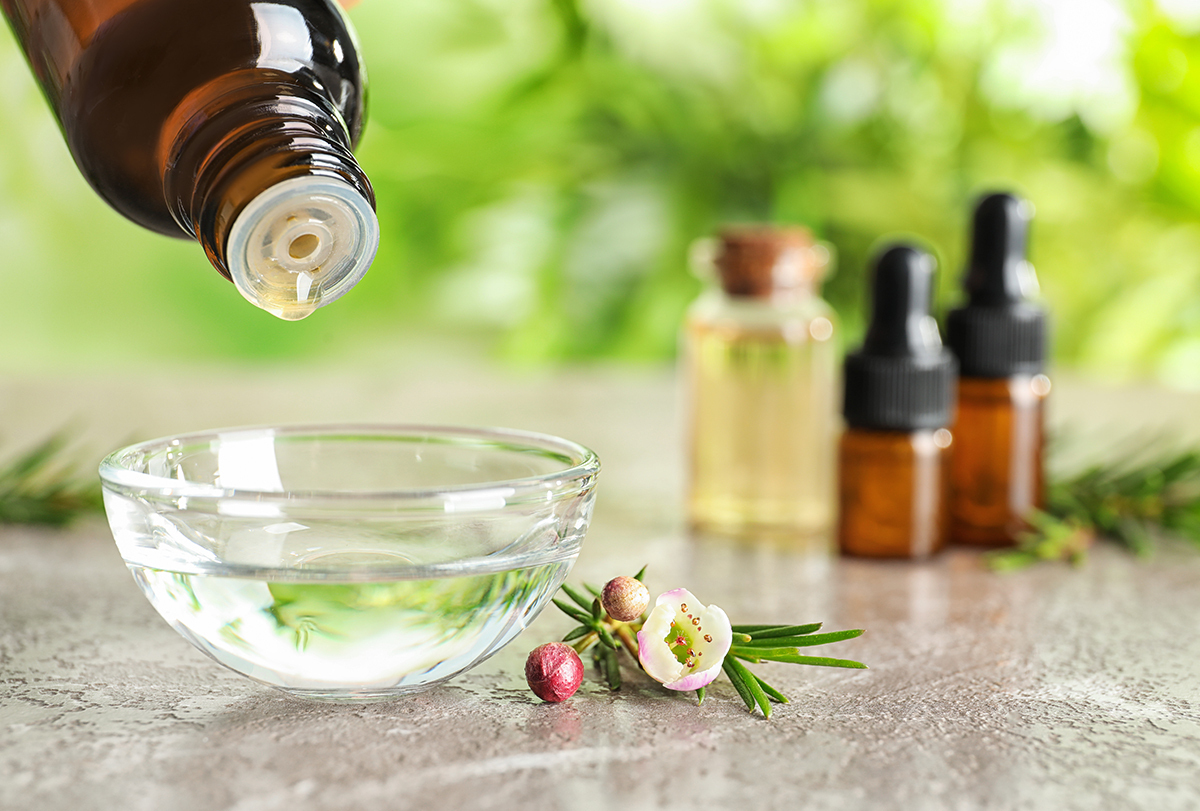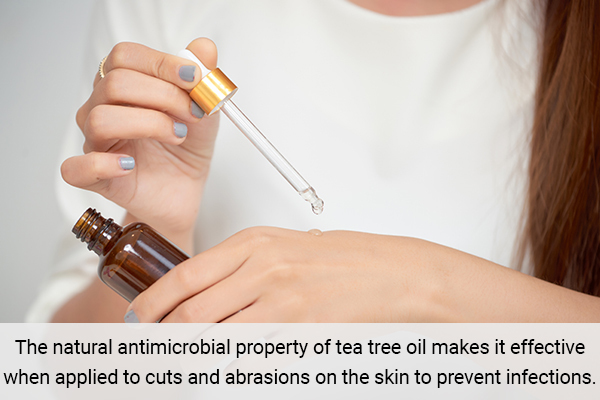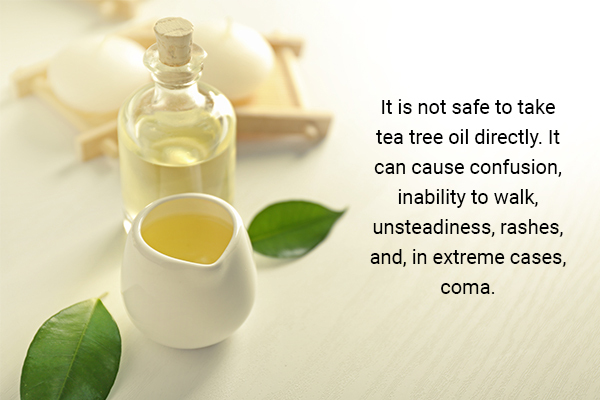In this article:
Tea tree oil is an essential oil extracted by steaming from the leaves of the tea tree plant Melaleuca alternifolia. It is pale yellow or colorless in appearance and has a strong camphor-like odor.

Though its popularity only increased in recent times, it has already been traditionally used by the Australian aboriginal tribes for the treatment of various ailments such as cough, colds, eczema, and various skin ailments.
Research in the twentieth century has confirmed its medicinal properties, and now it is widely used in the treatment of different bacterial fungal and viral infections either alone or in combination with other oils or pharmaceutical agents. (1)
Tea tree oil should not be confused with the tea that you drink daily, which is actually obtained by brewing the leaves of the totally unrelated Camellia species. The name tea tree was given to the plant by the famous explorer Captain James Cook. When he and his crew landed in Botany Bay, Australia, in the 18th century, they made tea from the leaves of this plant to prevent scurvy, thus the name tea tree.
The Australian aboriginal people had been using it to treat wounds long before that. Australian soldiers were issued tea tree oil as an antiseptic during World War II. Almost every household in Australia has a bottle of tea tree oil.
Though about 100 chemical components are reported in tea tree oil, the major component is terpinen-4-ol, which is found to have medicinal properties. (1) Terpinen-4-ol exhibits antimicrobial and immune-boosting properties.
Read on to know more about the health benefits of tea tree oil.
Benefits of Tea Tree Oil
Tea tree oil offers the following benefits for your overall health.
1. Supports skin health

Tea tree oil acts against many skin infection-causing bacteria and fungi. Hence, you can use it topically either as undiluted oil or in the form of an ointment for the treatment of skin infections such as acne and sunburn. (2)
Moreover, its antioxidant properties make it useful in smoothening wrinkles, making the skin soft and young looking.
Tea tree oil also has wound-healing properties and promotes rapid healing of wounds. (3) It can also be used effectively for treating skin warts without any adverse side effects. (4)
2. Reduces dandruff
Regular massage of the scalp with tea tree oil in combination with olive oil or coconut oil makes the scalp smooth and prevents flaking, thereby preventing dandruff. (5)
You can add a few drops of tea tree oil to your regular shampoo and use it to rinse your hair to obtain relief from dandruff.
3. Promotes oral health

The antibacterial properties of tea tree oil make it a suitable mouthwash to prevent the buildup of harmful bacteria in the mouth, thus reducing dental plaque formation, controlling bad breath, and reducing gum bleeding. (6)
The application of tea tree oil to swollen, painful gums has a soothing effect and reduces swelling due to its anti-inflammatory property.
You can add a few drops of tea tree oil to a glass of warm water and rinse your mouth after meals, or you can add a few drops of tea tree oil to your regular toothpaste and brush your teeth with it.
4. Repels insects
Tea tree oil keeps pesky insects such as houseflies and mosquitoes away. In one study, cows sprayed with tea tree oil had 67% lesser flies than those left untreated. (7)
5. Provides antiseptic effects

The natural antimicrobial property of tea tree oil makes it effective as a hand sanitizing agent.
Also, it can be applied to cuts and abrasions on the skin to prevent infections. Tea tree oil has been found to be effective against S. aureus infections, especially the hospital strain methicillin-resistant Staphylococcus aureus (MRSA). (8)
Clean the cut area with a wet cotton swab. Mix a drop of tea tree oil with some coconut oil, and apply it to the cut skin to prevent microbial infections.
6. Serves as a natural deodorant
Body odor results when secretions from your sweat glands combine with bacteria on your skin. Tea tree oil’s antibacterial property makes it ideal for natural deodorant formulations.
Mixing a few drops of tea tree oil with coconut oil and rubbing it on your skin could be a useful natural deodorant. Alternatively, adding a few drops of tea tree oil to a warm bath could keep the odor at bay and leave you feeling fresh the whole day.
7. Treats toenail fungus and eczema
Not only does tea tree oil have antifungal properties, which are beneficial in the treatment of fungal infections, but it also enhances the effectiveness of commonly used antifungal agents such as ketoconazole. (9) Tea tree oil also reduces skin inflammation due to eczema.
Mix a few drops of tea tree oil with coconut oil, and apply it to the affected area to treat eczema.
8. Relieves respiratory complaints

Globally a large number of people are affected by respiratory tract diseases caused by bacteria. Because of its volatility and antimicrobial property, tea tree oil can be used to effectively treat infections of the upper and lower parts of the respiratory tract (such as colds, influenza, and bronchitis) via inhalation.
For external application, liquid or semisolid preparations containing 5%–10% m/m of tea tree oil can be used. (10)
9. Treats parasitic infections
Many protozoan and helminthic infections affect vulnerable populations across the world, and currently, these are difficult to treat.
Tea tree oil contains many bioactive antiparasitic ingredients that are very effective in the treatment of parasitic infections such as leishmaniasis and worm infections. (11)
10. Exhibits anticancer properties
The major active component of tea tree oil, terpinen-4-ol, has antitumor activity. Tea tree oil has been shown to have anticancer effects on solid tumors present under the skin.
Moreover, tea tree oil is toxic to cancer cells. It has been shown to be especially effective against a particular type of cancer called melanoma. (12)
Safety Tips When Using Tea Tree Oil
- Tea tree oil is meant only for external use. Do not take tea tree oil internally.
- Preferably dilute tea tree oil with other oils before use, especially if you have sensitive skin.
- Tea tree oil should not be used by pregnant and breastfeeding women.
- Tea tree oil can cause irritation when brought into contact with the eyes, ears, contact lenses, and inner nose. Hence, keep tea tree oil away from these body parts.
Most-Asked Questions About Tea Tree Oil
Can I take tea tree oil directly?

It is not safe to take tea tree oil directly. It can cause confusion, inability to walk, unsteadiness, rashes, and, in extreme cases, coma.
How should I use tea tree oil for my hair, nails, and skin?
Dilute tea tree oil with regularly used oils such as coconut oil or almond oil, and apply the mixture to the affected part of the skin, nail, or hair.
How can I tell if the tea tree oil I have has expired?
Tea tree oil can be said to have expired if its smell or color has changed since you first opened the bottle or the consistency is thicker or thinner than when you first used it.
Final Word
Tea tree oil has many health benefits and can be used topically for the treatment of different skin diseases, but it should be used with care to avoid allergic reactions.
- Was this article helpful?
- YES, THANKS!NOT REALLY


